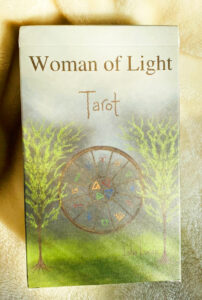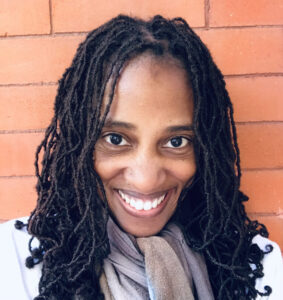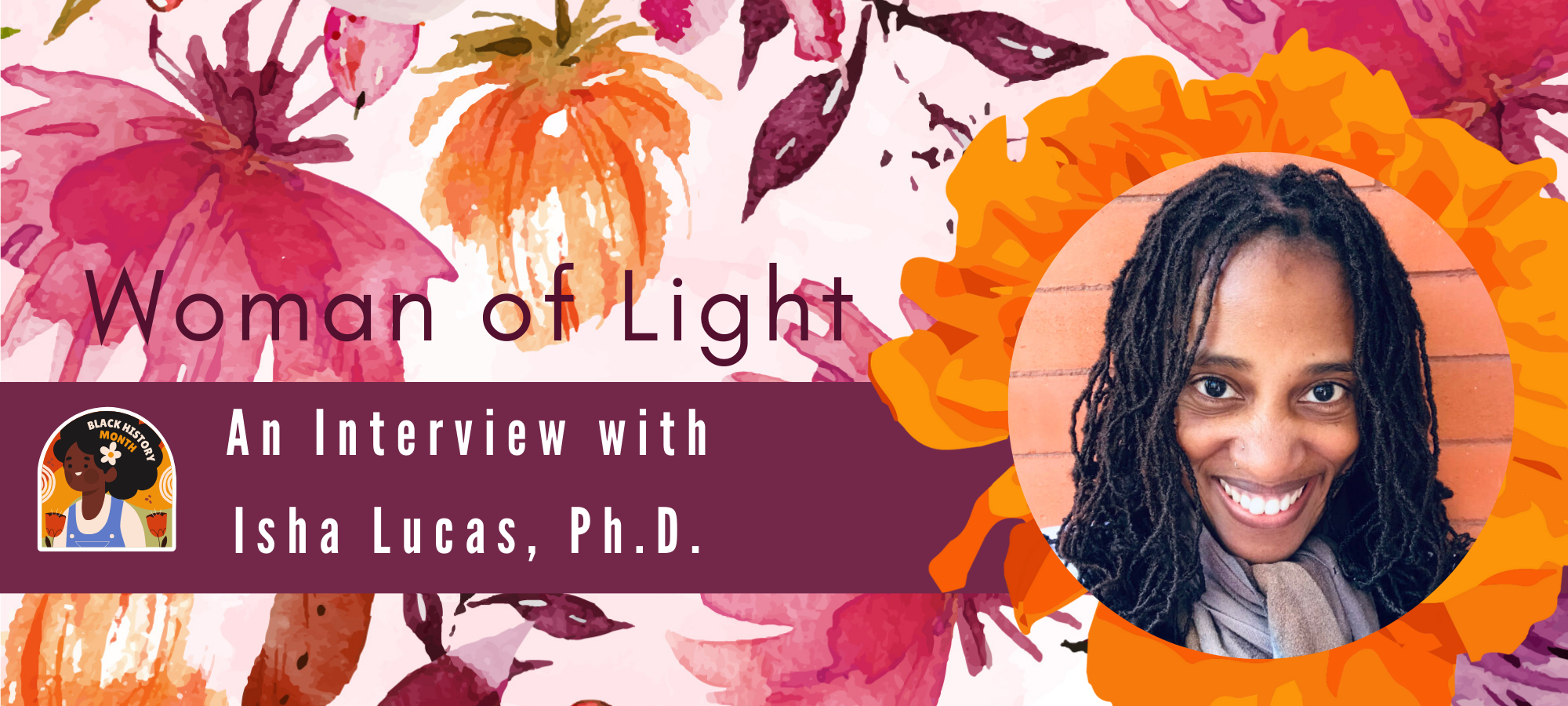Isha Lucas is a second-year student in Depth Psychology with a specialization in Integrative Therapy and Healing Practices. She is also the creator of the tarot deck Woman of Light, as well as having a psychotherapy practice. I’m excited to speak with her about her tarot deck and her psychotherapy work.
“As we are in the wake of the Civil Rights Movement, many things have shifted and yet the societal injury of racism still exists. At this time, political correctness is at the forefront of race relations. In some ways, it masks the truth of what manifests in the cultural psyche. Healing this trauma requires an understanding of its magnitude including historical and ancestral implications, along with compassion, forgiveness, and patience. These wounds affect our entire society, not just those typically labeled victim or oppressed. In order for us, as a people, to move toward health, we must first identify, understand, and then begin to heal these underlying wounds. It is my belief that through healing we can transform ourselves and in turn, society.” -Dr. Isha Lucas
Angela: To start with, I was hoping you might share some of your background. What were the moments that most shaped you to become your current incarnation of yourself?
 Isha: I lived with my father, and I grew up learning African drum and dance, and the teaching of “making a clean move,” which is about having awareness of how you’re moving in the world, how you show up, and the effect you have on the environment and the others around you. This was instrumental in my life. I connect the clean move to my understanding of African drum and dance because when you’re playing the drum or dancing, you have to listen. There’s a lot of getting out of your own way, a lot of letting go of ego. You have to be quiet in order to hear and feel meter; you have to be quiet so you can hear the others in the room.
Isha: I lived with my father, and I grew up learning African drum and dance, and the teaching of “making a clean move,” which is about having awareness of how you’re moving in the world, how you show up, and the effect you have on the environment and the others around you. This was instrumental in my life. I connect the clean move to my understanding of African drum and dance because when you’re playing the drum or dancing, you have to listen. There’s a lot of getting out of your own way, a lot of letting go of ego. You have to be quiet in order to hear and feel meter; you have to be quiet so you can hear the others in the room.
My father’s death was a transformative experience for me. Several months before he passed, I was visiting him, and I felt him say, not through words, but through his being, that he was dying. It was the clearest communication I’ve ever had. It was a deep knowing that he was communicating on a soul level. Then, to experience him going through the transition was different than anything else I’d experienced. I was his primary caretaker at that time, and I was in the room with him when he passed. It was transformative to shift from the position of child to that of the mother. It changed my life quite a bit. On a soul level, I needed to show up for him in this way and it shifted something in my core. It was like something was completed there.
Angela: You already have a Ph.D. in Anthropology and Social Change. Yet you’re enrolled in the Ph.D. in Integrative Therapy and Healing Practices at Pacifica. Why two doctorates? What led you to Pacifica?
Isha: While writing my dissertation for my first Ph.D., I had a surgery that further changed my life. I was battling between being healthy and unhealthy and going into the western medical world. I had this feeling that if I didn’t have the surgery, I’d be forced into relationship with this medical system through involuntary engagement, something like an “accident.” I understood that I was being called to surrender and engage with this western medical world. As I prepared for surgery, I started collecting tarot and oracle decks. I’d never been too into them before, but suddenly I began collecting all these decks. After the surgery, I started studying them, and reading the books that came with the cards, collecting other books about the tarot, and to reinforce my understanding of each card, I began drawing figures to represent them. Because I normally create things like bags, or dolls, or crafty kinds of things and I have never been great at drawing, I would draw very basic things like a cross to represent the hierophant, or a sun and a simple flower to signify the sun card. As I was learning the cards, I came to this realization that the tarot was another way of talking about the “Five Buddha Families,” a practice I learned in my therapy program. It comes out of Tibetan Buddhism, and it’s based on the five basic energies that exist in the world. Although it used me as a conduit, the deck really created itself and it was transforming me in the process. I was engaging in a different way, relating to the world in a new way. These characters started to form, and it became a deck. Each card really insisted on appearing in a certain way and, during their creation, I learned to listen, and even now I try to hear them.
The cards really guided me back to school. They felt like they needed to enter the therapy space and so, after I graduated from my first PhD program, and the deck was produced, I started a more serious therapy practice, and I brought the cards with me. The symbolism and archetypes seemed to help people to connect with certain energy or themes in their lives. As I was working with the cards in therapy, something more was being asked of me. I kept feeling like I needed to go back to school. I’d looked at Pacifica before, and I knew there was this Jungian, archetypal vibe, so the tarot felt like it was urging me back to psychology, back to school, and to Pacifica.
Angela: What are you studying now at Pacifica and how will it impact or add to your professional practice?
Isha: One of the things that feels important is looking at racial and intergenerational trauma. The tarot still feels relevant but, at this point, I don’t know exactly how these two will come together. Healing racial trauma and the archetypes in the tarot feel like they are in relationship, but I am trying to listen to how they need to interact.
Angela: You currently have a psychotherapy practice, “Cultivate Wildflowers,” where you focus on “mental, emotional, and spiritual health and wellbeing with an emphasis on racism.” Tell me a little about your practice and what kind of issues do you most often see arise when it comes to racism?
Isha: One of the major things that I’m noticing is that sometimes when Africanist people come to me, they are looking to heal some of the trauma of colonialism. An example would be potential clients wanting to be sure I’m a woman of color. They sometimes come to me because they haven’t been understood by their former mental health professionals. People often need recognition with a therapist that comes with my history, background, and race. So, on some level, the healing is in the acknowledgement that there’s something within the mental health field that ignores their experience. Some of what I help with is working through internalized oppression. This kind of oppression can sometimes be compounded when they interact with Euro-American practitioners, who may not understand what it’s like to have the direct experience of racial trauma. Sometimes it’s a lack of sensitivity or assumptions are made that further injure people. I also work on the other side of racism. Euro-American people sometimes come to me who are struggling with their contribution to racism and their disconnection from themselves, their disconnection from nature, life, and soul. Often, they are looking to work through the ways in which they perpetuate racism and self-aggression, and they are often struggling with ways to survive under capitalism that doesn’t further harm themselves or others.

Isha Lucas holds a Ph.D. in Anthropology and Social Change from the California Institute of Integral Studies, an MA in Contemplative Psychotherapy from Naropa University, a BA in Psychology with a minor in Philosophy from West Chester University, and is currently working on a PhD in Depth Psychology with a specialization in Integrative Therapy and Healing Practices at Pacifica Graduate Institute. As an anthropologist, she examines the world with curiosity. As a psychotherapist, she extends her being as a witness and guide. As a mixed-race colored woman, race is a big part of who she is. She recently developed a biracial tarot deck which she understands as an articulation of life as a spiritual journey and a manifestation of a certain truth as expressed through archetypes; she often uses this deck in therapy.

Angela Borda is a writer for Pacifica Graduate Institute, as well as the editor of the Santa Barbara Literary Journal. Her work has been published in Food & Home, Peregrine, Hurricanes & Swan Songs, Delirium Corridor, Still Arts Quarterly, Danse Macabre, and is forthcoming in The Tertiary Lodger and Running Wild Anthology of Stories, Vol. 5.


